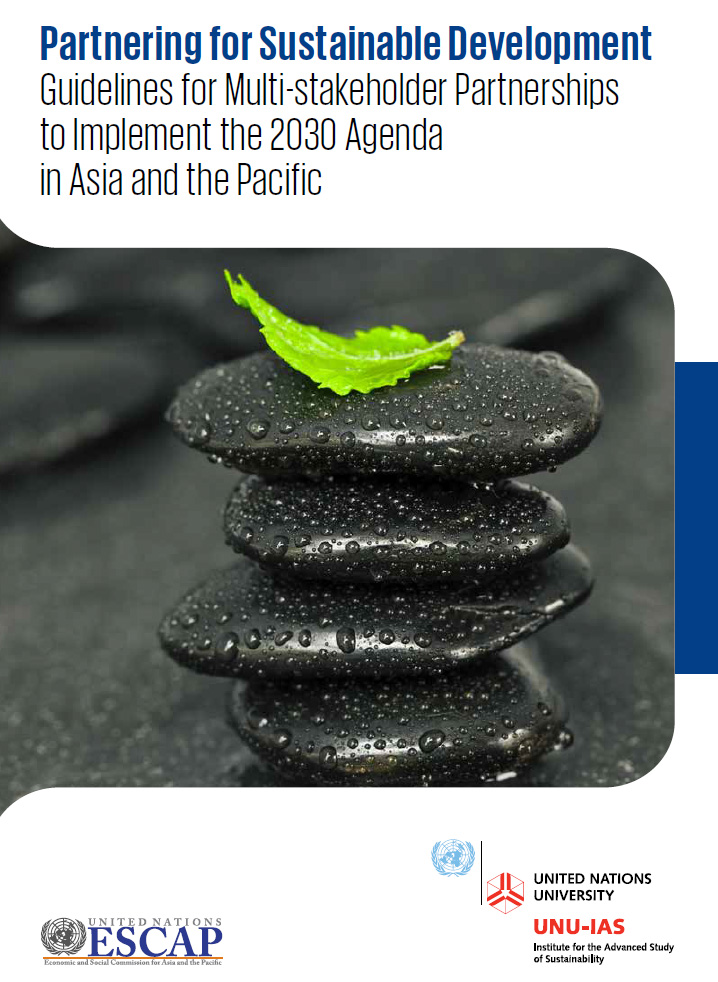Publications
Partnering for Sustainable Development - Guidelines for Multi-stakeholder Partnerships to Implement the 2030 Agenda in Asia and the Pacific
Publication Year: 2018 Publisher: UNESCAP
Multi-stakeholder partnerships
Related Goals
Background
Partnering for Sustainable Development: Guidelines for Multi-stakeholder Partnerships to Implement the 2030 Agenda in Asia and the Pacific was prepared jointly by the United Nations University Institute for the Advanced Study of Sustainability (UNU-IAS), Tokyo, and the United Nations Economic and Social Commission for Asia and the Pacific (ESCAP), Bangkok. The guidelines contained in this publication provide practical guidance for United Nations member States, policymakers, practitioners and other stakeholders to build, strengthen and implement effective multi-stakeholder partnerships aimed at accelerating implementation of the 2030 Agenda for Sustainable Development in the Asian and Pacific region. The guidelines also highlight some of the key challenges in, as well as main success factors for, building successful multi-stakeholder partnerships towards achieving the Sustainable Development Goals.
The publication is divided into four parts:
a. Chapter II, Framing Multi-stakeholder Partnerships for the 2030 Agenda, contains an explanation of the interface of the 2030 Agenda with the standard policy cycle, and that of the Multi-stakeholder Partnership Framework with Sustainable Development Goal-informed policy cycle. Further, it presents an outline of the Multi-stakeholder Partnership Framework;
b. Chapter III, Making or Breaking Partnerships: Challenges and Opportunities, contains a discussion of the key success factors as well as key challenges for building successful multi-stakeholder partnerships in the Asia-Pacific region;
c. Chapter IV, Guidelines for Multi-stakeholder Partnerships in the Asia-Pacific Region, presents the multistakeholder partnership guidelines and their five modules: (i) initiation; (ii) formation; (iii) managing implementation; (iv) review; and (v) reinvent or sustain. Each module consists of a number of multistakeholder partnership steps and requires users to go through a corresponding set of individual tasks. For each module, the chapter briefly presents the key principles as well as supporting case examples;
d. A brief section containing annexes provides relevant information on the multi-stakeholder partnership guidelines, including: (i) methodology for the preparation of the guidelines for the Asia-Pacific region; and (ii) resources for building and implementing partnerships and achieving the Sustainable Development Goals.
The publication is divided into four parts:
a. Chapter II, Framing Multi-stakeholder Partnerships for the 2030 Agenda, contains an explanation of the interface of the 2030 Agenda with the standard policy cycle, and that of the Multi-stakeholder Partnership Framework with Sustainable Development Goal-informed policy cycle. Further, it presents an outline of the Multi-stakeholder Partnership Framework;
b. Chapter III, Making or Breaking Partnerships: Challenges and Opportunities, contains a discussion of the key success factors as well as key challenges for building successful multi-stakeholder partnerships in the Asia-Pacific region;
c. Chapter IV, Guidelines for Multi-stakeholder Partnerships in the Asia-Pacific Region, presents the multistakeholder partnership guidelines and their five modules: (i) initiation; (ii) formation; (iii) managing implementation; (iv) review; and (v) reinvent or sustain. Each module consists of a number of multistakeholder partnership steps and requires users to go through a corresponding set of individual tasks. For each module, the chapter briefly presents the key principles as well as supporting case examples;
d. A brief section containing annexes provides relevant information on the multi-stakeholder partnership guidelines, including: (i) methodology for the preparation of the guidelines for the Asia-Pacific region; and (ii) resources for building and implementing partnerships and achieving the Sustainable Development Goals.

